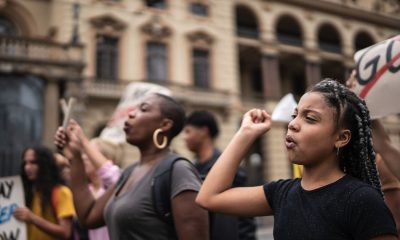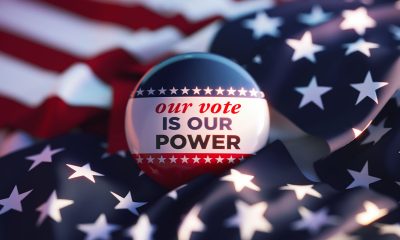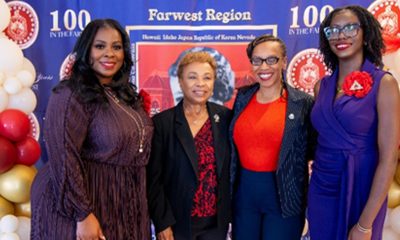National
Anniversary of Selma March Rekindles Ferguson Comparisons

In this March 13, 1965 file photo, a line of police officers hold back demonstrators who attempted to march to the courthouse in Selma, Ala. Police kept the demonstrators hemmed up in a square block area where they attempted several times to break through. (AP Photo/File)
JESSE J. HOLLAND, Associated Press
WASHINGTON (AP) — In only a few minutes on national television, the beatings of civil rights marchers by police on the Edmund Pettus Bridge in Selma, Alabama, dragged the inhumanity of Southern segregation into America’s living rooms as never before.
The images were unforgettable: police tear-gassing kneeling protesters, clubbing them and attacking them on horseback behind a civilian posse. Five decades later, many recalled that moment when police lobbed tear gas at protesters in Ferguson, Missouri, after the police shooting death last year of black 18-year-old Michael Brown.
President Barack Obama and some surviving marchers are going back to Selma this weekend to commemorate the 50th anniversary of that “Bloody Sunday” assault, and to talk about how the country has — and has not — changed since then.
Several Ferguson protesters also plan to go to Selma, hoping to ensure that more Americans will draw parallels between yesterday’s and today’s struggles. “It is clear that the struggle continues,” said human rights attorney Nicole Lee, who was in Ferguson during the unrest after police decided not to charge officer Darren Wilson in Brown’s death.
A grand jury declined to indict Wilson, and the Justice Department said Wednesday that it also would not seek to prosecute him. It did issue a scathing report that called Ferguson’s law enforcement practices discriminatory and unconstitutional.
Similar things were said about Selma after the police killing of Jimmie Lee Jackson, 26, who died a few days after being shot in the stomach by Alabama state trooper James Bonard Fowler while trying to protect family members during a melee following a voting rights protest in February 1965. A grand jury declined to indict Fowler.
Rep. John Lewis, then a student activist who was severely beaten in Selma, sees parallels between the 1965 marches and the #BlackLivesMatter movement that sprang up after Brown’s death. He also sees a major distinction.
“The only thing that is so different (is that) today, I don’t think many of the young people have a deep understanding of the ways of nonviolent direct action,” said Lewis, D-Ga.
Other Selma veterans say they fear their sacrifices are being wasted by those whose failure to vote leads to lack of representation in government and on police forces.
“Racism never went anywhere. Racism just took a nap, and when it woke up, we were watching … all those stupid reality shows. We let everything pass by us, and then we complain,” said Lynda Blackmon Lowery, who marched in Selma at age 15 and says she was one of the youngest marchers beaten on the bridge.
“There was nothing magic about Selma,” said Andrew Young, one of Martin Luther King Jr.’s closest aides and an organizer in King’s Southern Christian Leadership Conference. “Selma just gave us the right to vote. But if you don’t vote, and don’t take advantage of that right, you’re still living in a pre-Selma age.”
African-Americans voted at a higher rate than non-Hispanic whites in 2012 — 66.2 percent versus 64.1 percent — with Obama on the ballot. But voter turnout was down in last year’s midterm elections roughly three months after Brown was killed, and dismal in local elections. In Ferguson, fewer than 1,484 of the town’s 12,096 registered voters cast ballots in the last mayoral election.
Back in 1965, the SCLC targeted Selma as an area where they should challenge the lack of voting rights, Young said, and King called it “the most segregated city in America.”
Young said they came up with the idea to march from Selma to Montgomery at the funeral for Jackson, to make a voting rights statement and to protest Jackson’s death. Shocking images of the police beatings were broadcast nationwide; ABC interrupted its Sunday night movie, “Judgment at Nuremberg,” to air 15 minutes of uninterrupted footage from the Selma attacks.
“They broke into Hitler and the Nazi persecution of the Jews to (show) the persecution of African-Americans by state troopers in Alabama,” Young said. “People made the connection that this cannot be allowed to happen.”
Eighty-four people were injured in the violence, including Lewis, who suffered a skull fracture. In 2004, Fowler confessed to a newspaper reporter that he shot Jackson. He said he fired in self-defense after Jackson hit him on the head with a bottle. In 2010, Fowler pleaded guilty to second-degree manslaughter and was sentenced to six months in jail.
A few days after the Bloody Sunday assaults, King led a second march to the scene of the violence. A third march, on March 21, actually made it from Selma to Montgomery. Eight days later, President Lyndon Johnson spoke to a joint session of Congress, and compared Selma to some of America’s Revolutionary War battles.
Five months later, Johnson signed the Voting Rights Act of 1965, which ushered millions of African-Americans and other minorities onto voter rolls in the South.
___
EDITOR’S NOTE — Jesse J. Holland covers race, ethnicity and demographics issues for The Associated Press. Follow him on Twitter at http://www.twitter.com/jessejholland or contact him at jholland@ap.org.
Associated Press videojournalist Alex Sanz contributed to this story from Atlanta and Selma, Alabama.
Copyright 2015 The Associated Press. All rights reserved. This material may not be published, broadcast, rewritten or redistributed.
Activism
Oakland Post: Week of December 31, 2025 – January 6, 2026
The printed Weekly Edition of the Oakland Post: Week of – December 31, 2025 – January 6, 2026

To enlarge your view of this issue, use the slider, magnifying glass icon or full page icon in the lower right corner of the browser window.
Activism
2025 in Review: Seven Questions for Assemblymember Lori Wilson — Advocate for Equity, the Environment, and More
Her rise has also included several historic firsts: she is the only Black woman ever appointed to lead the influential Assembly Transportation Committee, and the first freshman legislator elected Chair of the California Legislative Black Caucus. She has also been a vocal advocate for vulnerable communities, becoming the first California legislator to publicly discuss being the parent of a transgender child — an act of visibility that has helped advanced representation at a time when political tensions related to social issues and culture have intensified.

By Edward Henderson, California Black Media
Assemblymember Lori D. Wilson (D-Suisun City) joined the California Legislature in 2022 after making history as Solano County’s first Black female mayor, bringing with her a track record of fiscal discipline, community investment, and inclusive leadership.
She represents the state’s 11th Assembly District, which spans Solano County and portions of Contra Costa and Sacramento Counties.
Her rise has also included several historic firsts: she is the only Black woman ever appointed to lead the influential Assembly Transportation Committee, and the first freshman legislator elected Chair of the California Legislative Black Caucus. She has also been a vocal advocate for vulnerable communities, becoming the first California legislator to publicly discuss being the parent of a transgender child — an act of visibility that has helped advanced representation at a time when political tensions related to social issues and culture have intensified.
California Black Media spoke with Wilson about her successes and disappointments this year and her outlook for 2026.
What stands out as your most important achievement this year?
Getting SB 237 passed in the Assembly. I had the opportunity to co-lead a diverse workgroup of colleagues, spanning a wide range of ideological perspectives on environmental issues.
How did your leadership contribute to improving the lives of Black Californians this year?
The Black Caucus concentrated on the Road to Repair package and prioritized passing a crucial bill that remained incomplete during my time as chair, which establishes a process for identifying descendants of enslaved people for benefit eligibility.
What frustrated you the most this year?
The lack of progress made on getting Prop 4 funds allocated to socially disadvantaged farmers. This delay has real consequences. These farmers have been waiting for essential support that was promised. Watching the process stall, despite the clear need and clear intent of the voters, has been deeply frustrating and reinforces how much work remains to make our systems more responsive and equitable.
What inspired you the most this year?
The resilience of Californians persists despite the unprecedented attacks from the federal government. Watching people stay engaged, hopeful, and determined reminded me why this work matters and why we must continue to protect the rights of every community in our state.
What is one lesson you learned this year that will inform your decision-making next year?
As a legislator, I have the authority to demand answers to my questions — and accept nothing less. That clarity has strengthened my approach to oversight and accountability.
In one word, what is the biggest challenge Black Californians are facing currently?
Affordability and access to quality educational opportunities.
What is the goal you want to achieve most in 2026?
Advance my legislative agenda despite a complex budget environment. The needs across our communities are real, and even in a tight fiscal year, I’m committed to moving forward policies that strengthen safety, expand opportunity, and improve quality of life for the people I represent.
Activism
2025 in Review: Seven Questions for Assemblymember Tina McKinnor, Champion of Reparations, Housing and Workers’ Rights
In 2025, McKinnor pushed forward legislation on renters’ protections, re-entry programs, reparations legislation, and efforts to support Inglewood Unified School District. She spoke with California Black Media about the past year and her work. Here are her responses.

By Joe W. Bowers Jr., California Black Media
Assemblymember Tina McKinnor (D-Inglewood) represents
California’s 61st Assembly District.
As a member of the California Legislative Black Caucus (CLBC),
McKinnor was elected in 2022. She chairs the Los Angeles County Legislative Delegation and leads the Assembly Public Employment and Retirement Committee. McKinnor also served as a civic engagement director, managed political campaigns, and worked as chief of staff for former Assemblymembers Steven Bradford and Autumn Burke.
In 2025, McKinnor pushed forward legislation on renters’ protections, re-entry programs, reparations legislation, and efforts to support Inglewood Unified School District. She spoke with California Black Media about the past year and her work. Here are her responses.
Looking back on 2025, what do you see as your biggest win?
Assembly Bill (AB) 628. If rent is $3,000, people should at least have a stove and a refrigerator. It’s ridiculous that people were renting without basic appliances.
I’m also proud that I was able to secure $8.4 million in the state budget for people coming home from incarceration. That includes the Homecoming Project, the menopause program for incarcerated women, and the Justice Leaders Program.
How did your leadership help make life better for Black Californians this year?
After the Eaton Fire, I pushed to get the same kind of support for affected areas that wealthier regions get after disasters.
I also did a lot of work building political power— establishing the Black Legacy PAC and California for All of Us PAC so we could support Black candidates and educate voters. We also called voters to make sure they understood Prop 50.
People need to understand this: there are only 12 Black legislators in the Capitol. Folks act like we can just walk in and pass reparations, but that’s not how it works.
What frustrated you most this year?
The governor did not have the political will to sign these bills: AB 57 and AB 62. They both passed overwhelmingly in the Assembly and the Senate. We did the work. The only person who didn’t have the political will to sign them was the governor.
The public needs to ask the governor why he didn’t sign the bills. We can’t keep letting people off the hook. He has to answer.
I also introduced AB 51 — the bill to eliminate interest payments on Inglewood Unified School District’s long-standing state loan — held in the Appropriations Committee. That was frustrating,
What inspired you most in 2025?
The civil rights trip to Alabama was life changing. We visited the Legacy Museum and the National Memorial for Peace and Justice. We took members of the Black, Latino, Jewish, and API caucuses with us. It changed all of us.
People aren’t always against us — they just don’t know our history.
What’s one lesson from 2025 that will shape how you approach decisions next year?
The legislative trip to Norway taught me that collaboration matters. Government, labor, and industry sit down together there. They don’t make villains. Everybody doesn’t get everything they want, but they solve problems.
What’s the biggest challenge facing Black Californians in one word?
Inequity. It shows up in housing, wealth, stress – all these things.
What’s the number one goal you want to accomplish in 2026?
Bringing back AB 57 and AB 62, and securing money for the Inglewood Unified loan interest forgiveness.
-

 Bay Area3 weeks ago
Bay Area3 weeks agoPost Salon to Discuss Proposal to Bring Costco to Oakland Community meeting to be held at City Hall, Thursday, Dec. 18
-

 Activism3 weeks ago
Activism3 weeks agoMayor Lee, City Leaders Announce $334 Million Bond Sale for Affordable Housing, Roads, Park Renovations, Libraries and Senior Centers
-

 Activism4 weeks ago
Activism4 weeks agoOakland Post: Week of December 10 – 16, 2025
-

 Activism3 weeks ago
Activism3 weeks agoOakland School Board Grapples with Potential $100 Million Shortfall Next Year
-

 Arts and Culture3 weeks ago
Arts and Culture3 weeks agoFayeth Gardens Holds 3rd Annual Kwanzaa Celebration at Hayward City Hall on Dec. 28
-

 Activism3 weeks ago
Activism3 weeks ago2025 in Review: Seven Questions for Black Women’s Think Tank Founder Kellie Todd Griffin
-

 Advice3 weeks ago
Advice3 weeks agoCOMMENTARY: If You Don’t Want Your ‘Black Card’ Revoked, Watch What You Bring to Holiday Dinners
-

 Activism3 weeks ago
Activism3 weeks agoAnn Lowe: The Quiet Genius of American Couture

























































